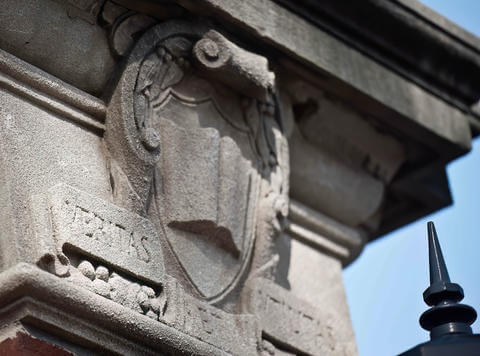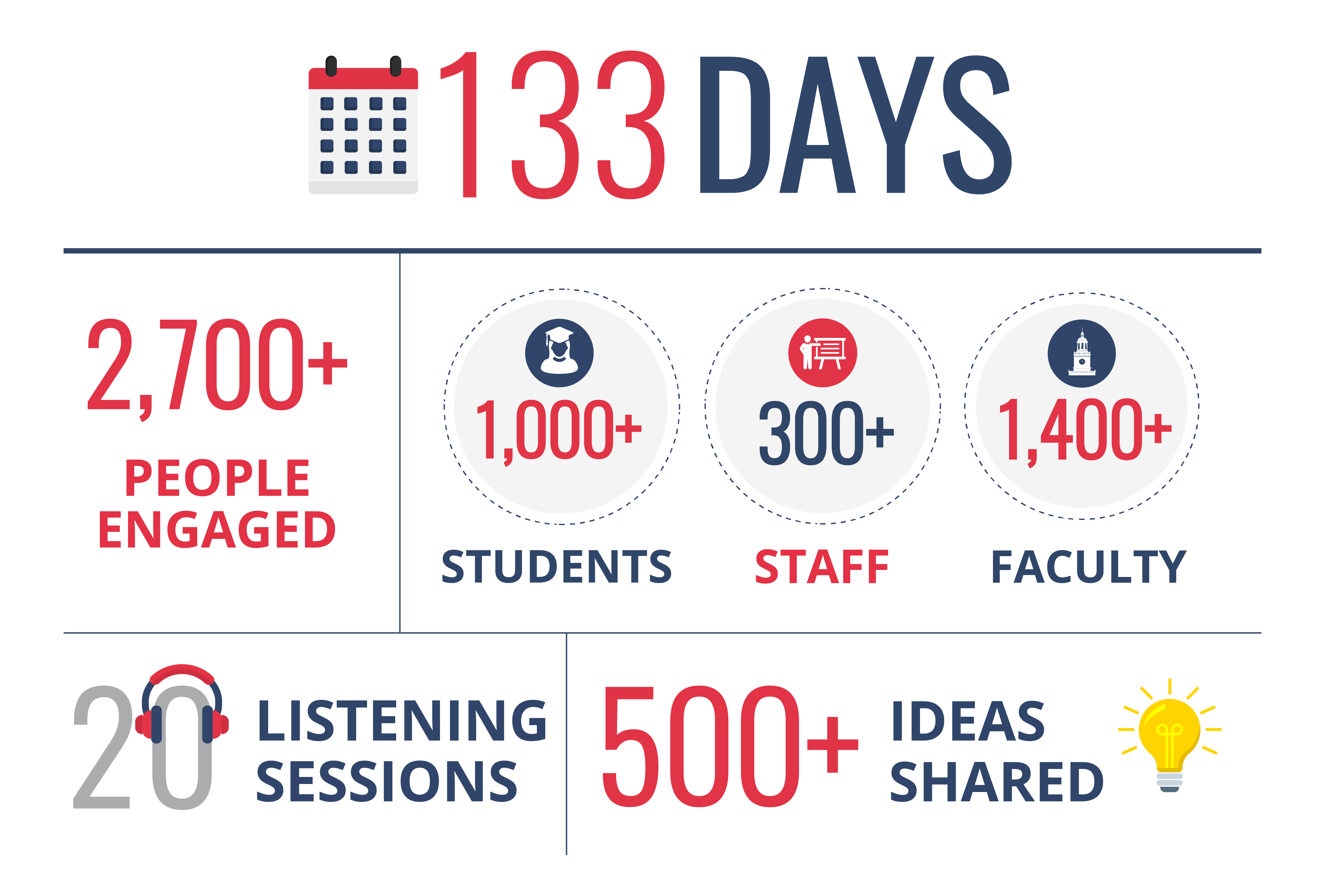
Bison Engagement Tour Report - Cloned
Ben Vinson III, PhD
President
Our approach
Sed ut perspiciatis unde omnis iste natus error sit voluptatem accusantium doloremque laudantium, totam rem aperiam, eaque ipsa quae ab illo inventore veritatis et quasi architecto beatae vitae dicta sunt explicabo. Nemo enim ipsam voluptatem quia voluptas sit aspernatur aut odit aut fugit
View video and full report below.
I am inspired by this community and what I know we can achieve together. In September, I embarked on the Bison Engagement Tour across our beloved campus, meeting with students, faculty, and staff to better understand both the challenges and opportunities ahead for our University.

Points of Pride
Howard University, a beacon of excellence and a pillar in the Black community, has long stood as a testament to resilience, innovation, and a deep-seated commitment to social justice and equity. President Vinson’s Bison Engagement Tour has underscored the university's multifaceted strengths and areas of pride that resonate deeply with students, faculty, and staff. These findings highlight the university's rich legacy and culture, its unwavering dedication to providing a quality education from a distinctly Black perspective, and its robust support for student growth and well-being.
Legacy and Culture
- Deep respect and pride in Howard's historical significance and contributions from civil rights to healthcare and much more.
- Inclusiveness and a welcoming atmosphere that creates a supportive community for Black individuals from diverse backgrounds.
- A tradition of service and advocacy, with a significant impact on communities in the National Capital Region area and partnerships with other HBCUs and global institutions.
Quality of Education
- Howard's strong brand attracts talented individuals globally, establishing it as a hub of Black higher education.
- Diverse and rigorous academic programs across fourteen schools and colleges, making it a leading institution for producing Black professionals.
- Education that emphasizes cultural relevance, social justice, and advocacy, attracting scholars and visitors worldwide.
- Unrivaled collections of fine arts and historical manuscripts, highlighting Howard's commitment to cultural preservation.
Research
- Significant growth in research productivity, external grants, and scholarly publications, putting Howard on the path to an R1 research designation.
- The establishment of the first University Affiliated Research Center (UARC) led by any HBCU, marking a major milestone towards becoming a research-intensive institution.
- Strong partnerships with industry, research agencies, and international institutions,
- facilitating impactful research and educational opportunities.
Planning
- The Howard Forward Strategic Plan leading to significant advancements in academic excellence, community service, and financial sustainability.
- Innovative strategic planning across schools and colleges to adapt to the evolving higher education ecosystem.
- Implementation of new systems like BisonHub to improve operational efficiency and facilitate academic and financial transactions.
Student Support
- A student-centered culture focusing on personal and professional growth, with faculty dedicated to pushing students to excel.
- Enhanced investment in student services, leading to improved retention and graduation rates.
- Comprehensive mental health services and unique support programs, emphasizing the importance of wellness in the community.
- The role of the University Chapel in promoting spirituality, wellness, community building, and civic engagement.
- Increased opportunities for study abroad, emphasizing the importance of global experiences for students.
Key Findings
The key findings and recommendations from the Bison Engagement Tour are organized according to the University’s five strategic pillars as outlined in the Howard Forward Strategic Plan: Enhancing Academic Excellence, Inspiring New Knowledge, Serving the Community, Improving Efficiency and Effectiveness, and Achieving Financial Sustainability.
Enhancing Academic Excellence
Since launching Howard Forward, the university has significantly invested in enhancing academic quality and improving students’ post-graduate outcomes. We’ve attracted and nurtured top-tier talent, such as Stacey Abrams, our inaugural Ronald W. Walters Endowed Chair for Race and Black Politics, and Sherrilyn Ifill, our inaugural Vernon Jordan Endowed Chair in Civil Rights. These appointments underscore our commitment to academic excellence and deepen the university's educational mission. Further, the university has continued to develop innovative programs to enhance student job prospects through the Academic Innovation Office.
Under President Vinson's leadership, Howard University is poised to further elevate its academic stature, informed by valuable feedback from students, faculty, and staff outlining a clear path to deepen the university's educational commitment, inclusivity, and innovation. For example, the Howard University School of Education recently established its inaugural degree completion program for a Bachelor of Science in Human Development, which is 100% online and provides students with the necessary skills and techniques to succeed in high-demand fields upon graduation.
Key Findings & Recommendations:
- Review general education requirements to ensure they provide diverse learning experiences.
- Expand access to a variety of general education courses, taking into account the need to accommodate increased enrollments and maintain course quality.
- Tackle the challenge of increasing student-to-instructor ratios, particularly with larger incoming student counts, by exploring options such as hiring additional faculty or incorporating blended learning models.
- Fully implement CourseDog to enhance Catalog and Curriculum Management, Course Scheduling, Room/Events scheduling, and to provide analytical insights for better demand projections and resource allocation.
- Enhance professional development programs for staff and faculty, with a focus on technical skills and current pedagogy.
- Continue investments in academic programs designed to bridge student gaps in writing and mathematics, such as the summer bridge program.
- Remove barriers in academic registration for transfer students by ensuring concurrent initiation of the process for all students.
- Enhance cross-campus integration by facilitating connections between student organizations and services, ensuring students from all schools feel included and have access to diverse programs and activities.
- Expand accessibility to university-sponsored events, such as athletic matches, guest speakers, and arts events, for students from different disciplines
- Strengthen Career Services by promoting partnerships between schools, colleges, and external organizations, and by leveraging faculty networks, complementing the efforts of newly hired Career Services staff.
- Encourage student journalism and media coverage of university events, providing practical experience and exposure for communications students.
- Review faculty responsibilities to address the balance between student advising, organization sponsorship, and teaching loads, ensuring equitable workload distribution.
- Increase visibility and recognition of faculty and student accomplishments across various platforms, celebrating and promoting their academic and professional achievements.
Inspiring New Knowledge
Howard’s recent accomplishments in research, innovation, and entrepreneurship have been nothing short of remarkable. We surpassed our research funding goal two years ahead of schedule—raising $122 million in 2022, a $31 million increase from the previous year – and secured groundbreaking grants to recenter the Black perspective across research disciplines. Notably, Howard became the first HBCU contracted by the Pentagon to establish a University Affiliated Research Center (UARC), receiving a five-year $90 million contract which will create opportunities for Howard students to obtain hands-on experience in research and development.
Under President Vinson’s leadership, Howard is set to regain R1 research university classification, a distinction no other HBCU has achieved. Our work to transform Howard into a cutting-edge research institution will further enhance our depth and diversity of scholarship.
Key Findings & Recommendations:
- Build upon Howard’s identity as the top producer of Black academics by further investing in post-graduate research development and opportunities across fields of study.
- Foster interdisciplinary and interprofessional collaborations through interdisciplinary centers, institutes, and forums addressing public issues and research problems, facilitating private-public partnerships.
- Strengthen and introduce initiatives to overcome departmental silos.
- Celebrate the graduation of the first online Master of Social Work cohort, using this milestone to assess the program's success and areas for improvement in Howard University's online education offerings.
- Investigate and formalize a school/university profit-sharing model for online programs, ensuring fair and sustainable financial arrangements as the university expands its online presence.
- Upgrade to R1 institution standards, including facilities, workloads, staff, and salaries.
- Encourage faculty to collaborate with undergraduate students on expanded research opportunities, such as grant proposals, conference presentations, and academic journal submissions.
- Expand the research office staff and streamline processes to assist faculty with external grant applications, leveraging grant writers or external companies.
- Enhance collaborations with R1 institutions, industry, government, and non-profits for research contracts and partnerships.
- Pursue innovative research areas with potential for external funding, such as AI, quantum computing, precision medicine, and climate change, leveraging industry collaborations and research networks.
- Improve communication and visibility of research achievements via the university’s website, social media, and media relationships.
Serving the Community
Howard University has a rich history of addressing challenges affecting the Black community, and it's evident that students, staff, and faculty are deeply connected to this mission. Over the years, Howard has raised awareness of social determinants of health that disproportionately impact the Black community and mobilized resources to help those in need. Most recently, in February 2024, Howard celebrated the 30th anniversary of its Alternative Spring Break program, which received a record 2,100 applicants. Each year, select Howard students focus on improving educational and economic outcomes in Black communities, both domestically and abroad. Concurrently, Howard has maintained strong partnerships with foundations and philanthropic organizations to advance the university’s mission of service, including its collaboration with the PNC Foundation, which aims to bolster resources and support for Black business owners across the country.
Under President Vinson’s leadership, Howard will continue to expand its service to the Black community and implement successful models for industry and community engagement.
Key Findings & Recommendations:
- Enhance collaborations with agriculture leaders and industry partners to address food insecurity in the local community.
- Build upon existing enrichment programs to expose high school students to campus life and higher education opportunities, particularly in fields where Black researchers and scholars are underrepresented.
- Continue to mobilize Howard’s research prowess and institutional power to impact physical determinants of health for the Black community, including by partnering with healthcare organizations to establish satellite clinics in underserved areas.
Improving Efficiency and Effectiveness
Howard Forward marked the start of the university's largest capital real estate initiative – a $785 million Campus Master Plan – which significantly accelerated the construction of new academic centers and improved administrative services. The Master Plan will revitalize Howard’s campus and ensure that our facilities are equipped with state-of-the-art equipment and resources to prepare our students for the workplaces and challenges of the future. Further, the university is bolstering campus housing and institutional management to meet the needs of a growing student body.
President Vinson will continue to incorporate feedback from the campus community to assess administrative and infrastructure challenge areas, and implement strategies that will improve the Howard experience.
Key Findings & Recommendations:
- Continue to foster a culture of transparency and communication, ensuring that students, staff, and faculty feel heard through regular touch points such as town halls with President Vinson and regular in-person meetings with campus leadership and the community.
- Prioritize and address the severe HVAC issues in the School of Social Work, Founders Library, Undergraduate Library (UGL), and other affected buildings to ensure a conducive environment for university operations.
- Create more tailored experiences for colleges located outside of the main campus, such as career fairs and faculty and student support services focused on their field of study.
- Assess and strategically plan for expanding physical infrastructure and resources to accommodate the growing student body and evolving academic needs.
- Explore and invest in modern, efficient HVAC systems and maintenance solutions to prevent future operational disruptions and ensure a comfortable environment for students and staff.
- Increase transparency of long-term facilities management and maintenance strategy for university buildings and infrastructure.
- Streamline the Workday transition by addressing the specific challenges in procurement, HR, and grants administration, ensuring smoother and more efficient processes.
- Revise approval flows within Workday to accurately reflect the necessary hierarchy, differentiating between those who need to approve and those who only need notification.
- Develop a support system within Enterprise Technology Services to cater to ad hoc and one-off needs, enhancing user experience and problem resolution.
- Recognize the need for additional administrative staff who are specialized in Workday processes to alleviate the burden on current staff wearing multiple hats.
- Expand staff professional development opportunities and mobility, creating clear paths for career advancement and skill enhancement.
- Continue to develop and promote HR initiatives such as the Leadership Academy and Staff Directory.
Achieving Financial Sustainability
Increased enrollment, alumni contributions, federal appropriations, and academic awards at Howard have significantly strengthened the university’s financial health. Last year, Howard’s endowment rose to $809 million, with a total of $60.4 million in gifts raised. Noteworthy contributions include a $20 million donation from Carrie Walton Penner and Greg Penner to support the GRACE Grant Endowed Fund, and MacKenzie Scott’s $12 million unrestricted gift for the College of Medicine. These donations will be vital for student retention and the construction of new innovation centers on campus.
Under President Vinson's leadership, Howard will continue to enhance its financial stability and outlook.
Key Findings & Recommendations:
- Assess and adjust university policies at all levels to align with the responsibilities and opportunities of R1 status, ensuring comprehensive support for research and academic excellence.
- Improve the Workday administrative process to provide principal investigators (PIs) with enhanced visibility and management capabilities for their grants.
- Address the impact of recruitment and award processes on doctoral conferral numbers by refining these procedures to better support student success and program growth.
- Develop clear guidelines and support systems for grant application and management, particularly for non-STEM fields.
- Engage in continuous dialogue with faculty to understand and address their concerns regarding financial sustainability and research support.







